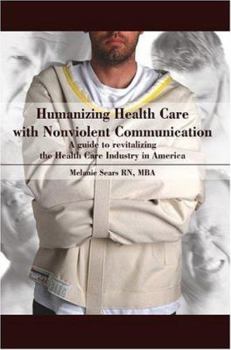Humanizing Health Care with Nonviolent Communication: A Guide to Revitalizing the Health Care Industry in America
The truth about health care: how hospital politics often prevents patients from getting the care they need.Melanie Sears shares her insights as a nurse and a certified instructor of Nonviolent... This description may be from another edition of this product.
Format:Paperback
Language:English
ISBN:059540278X
ISBN13:9780595402786
Release Date:January 2006
Publisher:iUniverse
Length:68 Pages
Weight:0.05 lbs.
Dimensions:0.2" x 6.0" x 9.0"
Customer Reviews
1 rating
HOW ABOUT COMPASSION FOR THE COMPASSIONATE PROFESSION
Published by Thriftbooks.com User , 18 years ago
HOW ABOUT COMPASSION FOR THE COMPASSIONATE PROFESSION by Mary Koch in Journal of Healing - Sept. 6, 2006 Our oldest grandchild visited and announced that in January, after years of juggling care of family, classes and work, she will begin her first "real" job as a licensed practical nurse. But Stacey's not done yet. She plans to earn her registered nurse (R.N.) credentials in another year. She'll have job security. Forecasters say that by the year 2020, we'll have an estimated shortage of 800,000 nurses. Currently 2.4 million registered nurses constitute the largest health care occupation in our country. They also constitute an immeasurable impact on the health and welfare of patients. In a battered, spiral notebook by my desk is the list of nurses who cared for my husband in the intensive care unit immediately after his stroke in 1993. As the days and nights flowed one into another, I meticulously wrote the nurse's name at each shift change: May, Cathy, Joe, Madge, Janet, Cecelia, Nancy, Tina, Julie, Sheila, Elaine, Lorena, Pam, Christy, Marcia, Terrie, Ernie, Craig, Jackie, Marilyn, and KJ. John was attached to a web of high-tech wires and lines, but I was convinced his real lifeline was the nurses. I meant to write each a personal thank-you. But then came rehabilitation nurses, more hospital nurses, then home health nurses. The list stretched into the hundreds. * * * WITH ALL that exposure to the nursing profession, I've learned one thing: Nurses can empower or nurses can overpower. Most, in a very healing way, empowered both my husband and me, his caregiver. The few who overpowered left scars on my soul. Not battle scars. When your husband is lying in a hospital room, totally paralyzed, you don't fight the nurse. Who knows what kind of retaliation he'd be subjected to when you inevitably have to leave the room? I swallowed a lot of anger, deferring to power-obsessed nurses. I understand better now, especially after reading the recently-published book, "Humanizing Health Care with Nonviolent Communication," that their power-wielding was very likely a symptom of burn-out. The book is written by a veteran R.N., Melanie Sears, who works in the psychiatric intensive care unit at Seattle's behemoth Harborview Medical Center. "Working with sick people is emotionally taxing," Sears notes. She continues that when you combine that emotional challenge with staffing shortages and a system that doesn't always respect nurses, it's hard to maintain a positive attitude. * * * WHAT IS needed, Sears advises, is what we always expect from nurses: compassion. Not compassion for patients; compassion for the nurses themselves. "The more compassionate we are with ourselves, the more compassion we have for others," she writes. "When we judge and criticize ourselves, we are likely to judge and criticize others. What is within is without." Sears describes nurses who have burned out: "They have played out the role of the `good' nurse who gives





